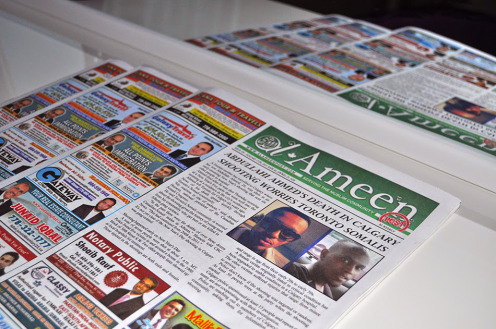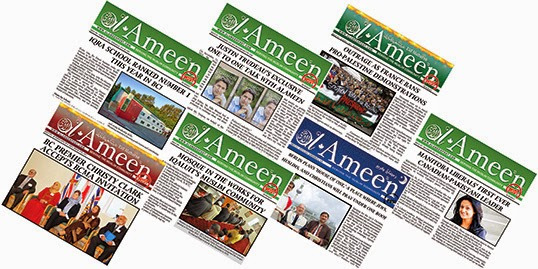| |

 Print
Feature Article: Journalism, Islam and freedom of expression: how to manage the equation?
1-29-2015
At a time when amalgams are going well, it is often difficult for community newspapers to deal with certain social issues. How do they define their editorial policy? On what obstacles they stumble? Meeting with the editor of Al-Ameen Post in Surrey, attempting to fight against stereotypes faced by Muslims.
Mohammed Jafar Bhamji and his team did not study journalism and do not consider to elsewhere as media professionals. It is with heart and dedication they hold since 2002 Al-Ameen Post, a local community newspaper devoted to news of the Muslim community. This bimonthly designed in Surrey draws to 3000 copies. "Our goal is to build bridges and promote a moderate and peaceful Islam. We try to inform our readers on subjects that - we think - will interest them, "said Mohammed Jafar Bhamji, adding that its readership consists primarily of the Sunni Muslim fringe residing in the Greater Vancouver area.

The cover of Al-Ameen Post is varied: local events, seminars and conferences, practical information on prayer times or local halal restaurants and of course the news of the local Muslim community, national and international. On this last point, Mohammed Jafar Bhamji says that it is sometimes difficult to address some issues. "Choose the topics we want to cover or not is often a sensitive issue. We try to tell, especially positive stories that highlight the humanist character of Muslims. But for obvious reasons shade and editorial balance, we also publish articles about events that have a negative impact on the image of our religion."
"The view of Muslims neglected"
The recent terrorist attacks in Paris are part of these thorny issues. "Propaganda and acts carried out by extremist groups like the Islamic State (EI), Al Qaeda, Boko Haram and the Taliban do great harm to Muslims and Islam. That is why we are really qualify our products and educate our readers on the true lessons of our faith, "said Mohammed Jafar Bhamji. Despite his efforts, he regrets that the voice of Muslims is not sufficiently heard in the mainstream media. "The debates and discussions on the Paris attacks have largely ignored the Muslims and their perspective on this tragedy," he says.
"According to official statistics, 52% of Canadians believe that Muslims do not condemn enough extremist groups like Boko Haram or EI. But when Muslim organizations and religious leaders do, the information is not relayed in the major media even as our community has nearly a million people in the country, "said Mohammed Jafar Bhamji. He says "Frustrated" at not having enough resources to spread Islam's message of peace among Canadians.
Mohammed Jafar Bhamji however, like to welcome the decision of many Canadian media not to spread the news of Charlie Hebdo A that has a caricature of Mohammed, whose representation is not permitted, by most Muslims. The Prophet tear to the eye, waved a placard "I'm Charlie." Mohammed Jafar Bhamji values French satirical newspaper is attacking, once again, that Islam and not equally to other religions. "This kind of irresponsible media plays a role in the rise of Islamophobia, especially in Canada."
Show or not to show the cartoons
The same opinion, Ali Zafar, a journalist for the daily Metro Vancouver, wrote in a recent forum that stubbornly want to publish cartoons of the prophet in the name of freedom of expression does "awaken a little more hostility towards a group already marginalized, especially in France. These drawings play with the fear of the Muslim and only fuel Islamophobia, "he loose, deploring the dozens of Islamophobic attacks recorded since the Parisian dramas of 7 and 9 January

But face it, those who decided to publish the news satires defend the prophet. Libération, for example, Anglo-Saxon media accused of having "deflated". Fraidenraich Pierre, director of the French daily operations that currently hosts the team survivor Charlie Hebdo, denounced a lack of courage. "I am amazed that these nations involved mostly to the international force fighting against terrorism, including the price of the death of our soldiers are afraid to publish in the headlines of their media this strong message of say that despite the terror, horror and abomination, the press is alive, "he said on Radio-Canada.
Several notions of freedom of expression
Nabil Wakim is a reporter for the daily Le Monde. It explains tearing, among others, a fundamental cultural difference between the Anglo-Saxons and France. A cultural difference in the concept of freedom of expression. "In France, (published the cartoons) is seen as an act of courage and strength, an act of freedom of press publishers. And a claim that the right to blaspheme, found an important right for many French, "he describes in a personal text published on the Web. He added that for the vast majority of French citizens, turning religion into derision is not considered racist, it is even "a political task performed by most liberals since the French Revolution."
However, the issue divides even within France. According to a recent poll published in Le Journal du Dimanche, more than four in ten French (42%) believe it is necessary to avoid publishing cartoons of the Prophet Muhammad, and half (50%) are in favor of restricting freedom of expression, including on the Internet.
Footnotes:
|